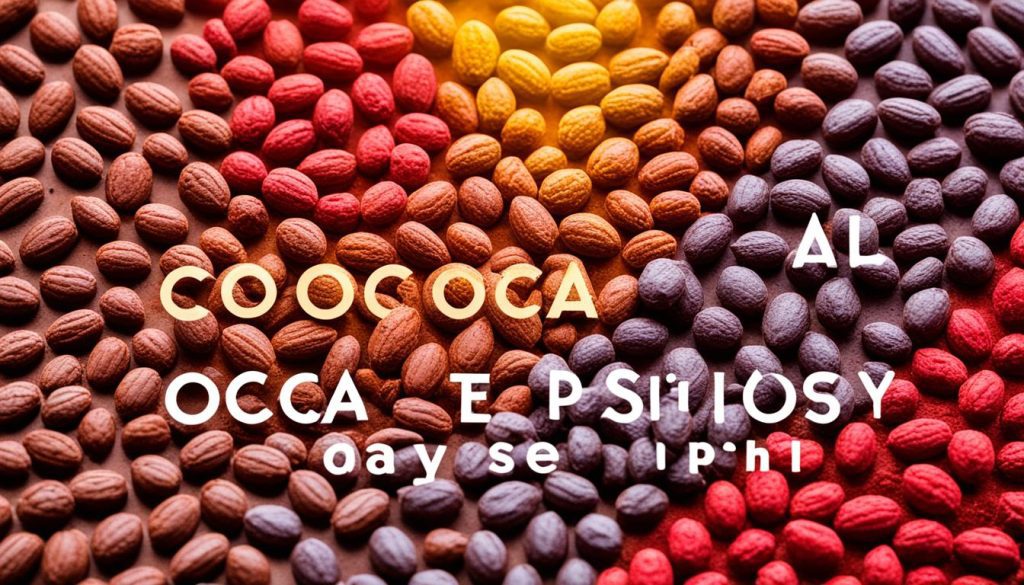Greetings! Today, I want to share with you the wonderful health benefits of the cocoa plant. You may already be familiar with cocoa as a delicious ingredient in your favorite chocolate treats, but did you know that it also has numerous natural remedies and properties that can improve your overall health and well-being?
The cocoa plant is packed with essential nutrients, powerful antioxidants, and beneficial phytochemicals. It contains a wide range of polyphenols, such as catechins, anthocyanidins, and proanthocyanins, which have been extensively researched for their positive effects on health. Additionally, cocoa is rich in important minerals like phosphorus, iron, potassium, copper, and magnesium.
Research has shown that cocoa offers a variety of health advantages. Regular consumption of cocoa has been linked to cardiovascular benefits, improved glucose homeostasis, potential cancer prevention, weight control, a strengthened immune system, and enhanced cognitive function. These findings make cocoa a valuable natural remedy for promoting overall health and well-being.
Health Benefits of Cocoa Plant
- Cocoa is a plant that offers numerous health benefits.
- It is rich in nutrients, antioxidants, and phytochemicals.
- Cocoa has therapeutic uses and is being extensively researched for its medicinal properties.
- Regular consumption of cocoa has been associated with cardiovascular benefits, improved glucose homeostasis, potential cancer prevention, weight control, a strengthened immune system, and enhanced cognitive function.
- Cocoa is a valuable natural remedy for promoting overall health and well-being.
The Nutritional Aspects of Cocoa
When it comes to cocoa, there’s more to it than just its delicious taste. Cocoa offers a wealth of nutritional benefits that make it a valuable addition to a healthy diet. Let’s dive into the key nutritional aspects of cocoa.
Cocoa Fat
Cocoa is rich in fat, particularly cocoa butter. This fat is mainly composed of oleic acid, palmitic acid, and stearic acid, which are all important for various bodily functions. While it’s true that cocoa fat contributes to its calorie content, it’s important to note that not all fats are created equal, and cocoa fat can be a part of a balanced diet when consumed in moderation.
Cocoa Polyphenols
One of the standout nutritional components of cocoa is its high polyphenol content. Polyphenols are a group of beneficial plant compounds that have antioxidant properties and offer potential health benefits. In cocoa, the polyphenols include catechins, anthocyanidins, and proanthocyanins. Proanthocyanins are the most prevalent polyphenols in cocoa. These polyphenols play a role in promoting overall health and well-being.
Cocoa Bitterness
If you’ve ever tasted unprocessed cocoa beans, you know they can be quite bitter. This bitterness is due to the presence of polyphenols in cocoa. However, processing techniques have been developed to reduce this bitterness while maintaining some of the polyphenol content. It’s worth noting that the bitterness of cocoa can vary depending on the specific cocoa bean variety and the level of processing it has undergone.
Cocoa Beans
Cocoa beans are the source of all things chocolate. They are the seeds of the cocoa plant and contain various nutrients that contribute to cocoa’s nutritional profile. In addition to the aforementioned fat and polyphenols, cocoa beans also contain nitrogenous compounds such as protein, as well as methylxanthines like theobromine and caffeine. These compounds give cocoa its stimulating properties.
Cocoa Minerals
Cocoa is also a rich source of essential minerals. It contains important minerals like phosphorus, iron, potassium, copper, and magnesium, which have various roles in the body. These minerals are essential for maintaining proper functioning of bodily systems and supporting overall health.

To experience the nutritional benefits of cocoa, it’s important to choose high-quality cocoa products and consume them as part of a balanced diet. Incorporating cocoa into your diet can be as simple as enjoying a piece of dark chocolate or adding cocoa powder to your smoothies or desserts. Remember, moderation is key to enjoying the nutritional advantages that cocoa has to offer.
Cardiovascular Effects of Cocoa Consumption
Regular consumption of cocoa, particularly in the form of dark chocolate, has been associated with several beneficial effects on the cardiovascular system.
The polyphenols present in cocoa, especially dark chocolate, can activate endothelial nitric oxide synthase, leading to the production of nitric oxide, which promotes vasodilation and lowers blood pressure.
Studies have shown improvements in pulse wave speed and sclerotic score index, indicating enhanced vascular function.
The presence of higher concentrations of plasma epicatechins and procyanidins in the blood aids in the release of endothelium-derived vasodilators and increases the production of nitric oxide, further contributing to protection against thrombosis.
Effects of Cocoa Consumption on Glucose Homeostasis
Cocoa consumption has been shown to have positive effects on glucose homeostasis, thanks to the presence of cocoa flavanols. These compounds play a role in slowing down carbohydrate digestion and absorption in the gut, leading to more stable blood sugar levels.
Research has also found that cocoa extracts and procyanidins, naturally occurring in cocoa, can inhibit the activity of pancreatic enzymes involved in carbohydrate digestion. By slowing down the breakdown of carbohydrates, cocoa helps prevent spikes in blood sugar levels.
Furthermore, cocoa and its flavanols have been found to regulate glucose transport and insulin signaling in insulin-sensitive tissues such as the liver, adipose tissue, and skeletal muscle. This regulation helps improve insulin sensitivity and reduce oxidative stress and inflammation associated with conditions like type 2 diabetes.
Several studies have indicated that higher intake of cocoa-derived flavonoids and chocolate products is associated with a lower risk of developing type 2 diabetes. Cocoa consumption has also been linked to a reduced risk of gestational diabetes in pregnant women.
While the evidence suggests that cocoa consumption can be beneficial for glucose homeostasis and diabetes prevention, it is important to note that further research is still needed to fully understand the mechanisms and effects of cocoa on these conditions.

- Cocoa flavanols slow down carbohydrate digestion and absorption in the gut.
- Cocoa extracts and procyanidins inhibit pancreatic enzymes involved in carbohydrate digestion.
- Cocoa regulates glucose transport and insulin signaling in insulin-sensitive tissues.
- Higher intake of cocoa-derived flavonoids is associated with a lower risk of type 2 diabetes.
- Cocoa consumption may also reduce the risk of gestational diabetes in pregnant women.
Potential Effects of Cocoa on Cancer
The effect of cocoa consumption on cancer remains a subject of ongoing debate in the scientific community. While some studies suggest that cocoa may possess anti-cancer properties, others have yielded conflicting results. However, certain compounds found in cocoa, particularly procyanidins, have shown promise in reducing the incidence and size of specific types of tumors in animal studies.
In addition to tumor growth inhibition, cocoa procyanidins have demonstrated the ability to inhibit tumor-associated activities, such as tumor vascular endothelial growth factor activity and angiogenic activity. These findings indicate that cocoa may play a role in suppressing the growth and development of tumors.
In vitro studies have further revealed the cytotoxicity and chemosensitization properties of cocoa rich in procyanidin in various types of cancer cell lines. These findings suggest that cocoa may enhance the effectiveness of chemotherapy treatments and sensitize cancer cells to their cytotoxic effects.
However, it is essential to note that further research is necessary to fully understand the mechanisms underlying cocoa’s anti-cancer activity and its potential effects on human cancer. Continued investigation in this area will help shed light on cocoa’s role in cancer prevention and treatment.
- Cocoa consumption’s impact on cancer is a subject of ongoing research and debate.
- Procyanidins, a compound found in cocoa, have demonstrated potential in reducing tumor incidence and size in animal studies.
- Cocoa procyanidins can inhibit tumor-associated activities such as tumor vascular endothelial growth factor activity and angiogenesis.
- In vitro studies have shown that cocoa procyanidins exhibit cytotoxicity and chemosensitization in various cancer cell lines.
- Further research is needed to elucidate cocoa’s anti-cancer mechanisms and its potential effects on human cancers.
Conclusion
The cocoa plant is a treasure trove of health benefits. Packed with essential nutrients, polyphenols, and minerals, cocoa offers a range of advantages for overall well-being. Regular consumption of cocoa and its derivatives, like dark chocolate, has been linked to improved cardiovascular health, better glucose regulation, potential cancer prevention, and enhanced cognitive function.
One of cocoa’s key strengths lies in its antioxidant and anti-inflammatory properties, which contribute to its remarkable health advantages. However, it is crucial to bear in mind that the processing of cocoa can impact its beneficial properties. Therefore, moderation is necessary when indulging in chocolate products, mindful of added sugar and fat content.
While significant research has already been conducted on cocoa and its health benefits, further exploration is still needed to fully comprehend its therapeutic uses and medicinal potential. Incorporating cocoa powder and cocoa-rich products into a balanced diet can provide natural remedies for promoting health and well-being. So, go ahead and savor the delightful flavors and numerous health benefits of cocoa!
FAQ
What are the health benefits of the cocoa plant?
The cocoa plant offers numerous health benefits due to its rich nutrient content, including antioxidants, polyphenols, and essential minerals. Regular consumption of cocoa and cocoa-derived products has been associated with cardiovascular benefits, improved glucose homeostasis, potential cancer prevention, and enhanced cognitive function.
What nutrients are found in cocoa?
Cocoa contains essential minerals like phosphorus, iron, potassium, copper, and magnesium. It is also rich in polyphenols, including catechins, anthocyanidins, and proanthocyanins, which have various positive health effects.
How does cocoa consumption affect the cardiovascular system?
Regular consumption of cocoa, especially dark chocolate, has been associated with improvements in vascular function, lower blood pressure, and protection against thrombosis. The polyphenols in cocoa activate endothelial nitric oxide synthase, leading to the production of nitric oxide, which promotes vasodilation.
Can cocoa help with glucose homeostasis?
Cocoa and its flavanols have been found to improve glucose homeostasis by slowing down carbohydrate digestion and absorption in the gut. Additionally, cocoa regulates glucose transport and insulin signaling in insulin-sensitive tissues, reducing oxidative and inflammatory damage associated with type 2 diabetes.
What is the potential effect of cocoa on cancer?
The effect of cocoa consumption on cancer is still a topic of debate. Some studies suggest that cocoa, particularly procyanidins found in cocoa, may have anti-cancer properties. They have been shown to reduce tumor incidence and size in animal studies and inhibit tumor-associated activities in vitro. However, more research is needed to understand cocoa’s anti-cancer activity and its potential effects on human cancer.
Are there any precautions to consider when consuming cocoa?
While cocoa offers health benefits, it is important to consume it in moderation, considering the added sugar and fat content in chocolate products. Additionally, the processing of cocoa can impact its beneficial properties. Further research is also needed to fully understand the therapeutic uses and potential medicinal properties of cocoa.




